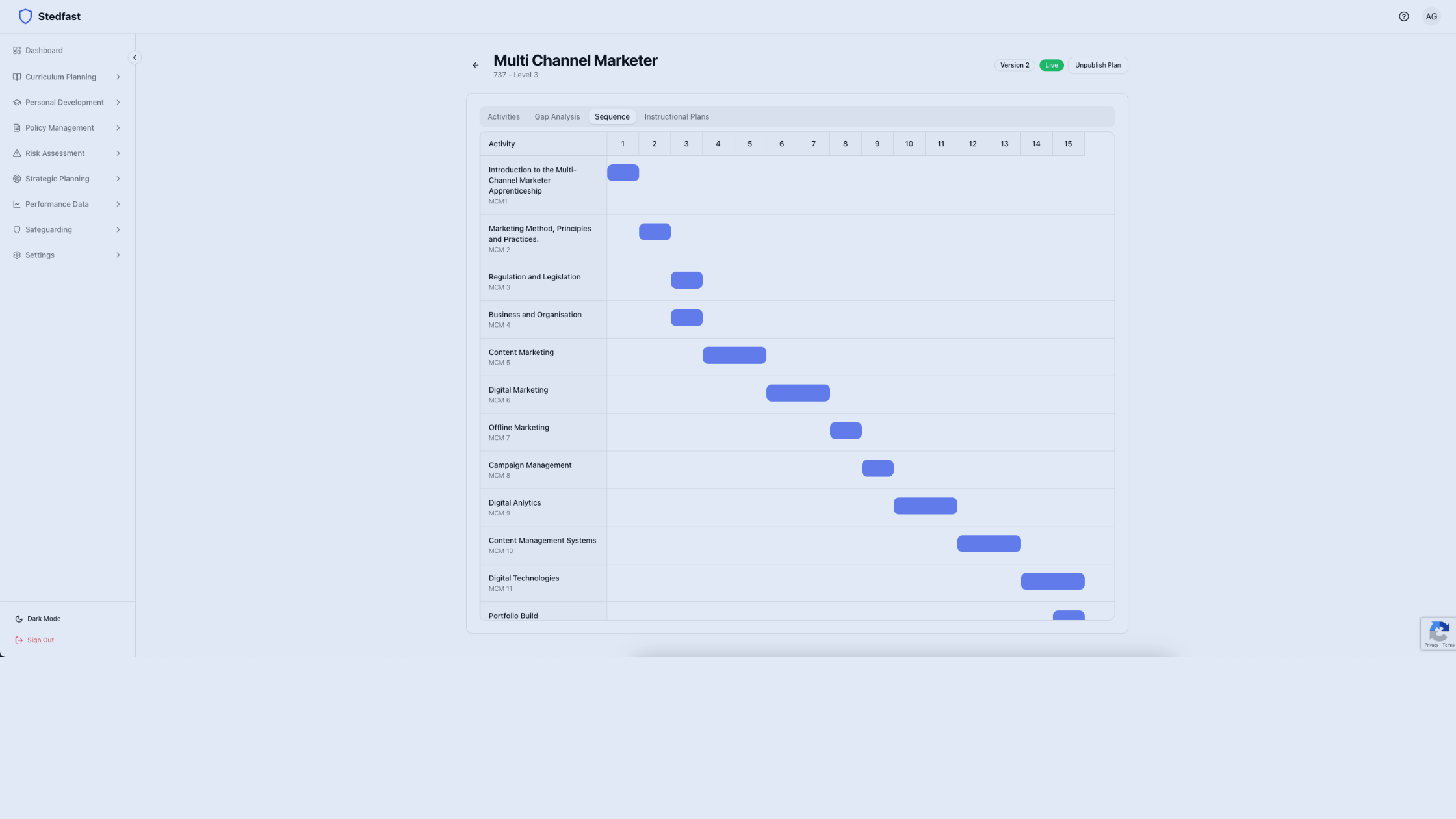Assessment is at the centre of vocational learning. It provides the evidence that a learner has met the required standards and is ready to progress, achieve a qualification, or demonstrate competence in the workplace. For assessors, however, assessment is not just about judging performance at a single point in time. It is a structured process that begins with careful planning, continues through evidence gathering and decision-making, and concludes with clear feedback and accurate record-keeping.
Planning is the stage that underpins the whole assessment cycle. Without a clear plan, assessments risk being inconsistent, rushed, or unfair. A well-prepared plan ensures that learners know what is expected, that evidence is gathered efficiently, and that assessment decisions stand up to scrutiny from quality assurers and awarding bodies. Planning also helps the assessor manage practical factors such as time, resources, and communication with learners and employers.
In this article, we explore the key considerations when planning assessment, from understanding the standards and criteria to ensuring compliance with the awarding body’s assessment strategy. These principles are particularly important for trainee assessors, but are equally relevant to any professional involved in vocational assessment.
Why is planning assessment important?
Effective assessment planning provides structure and clarity. It sets expectations for learners, ensures that evidence is valid and reliable, and helps maintain the integrity of the qualification. Without good planning, assessments risk being inconsistent, rushed, or failing to meet the standards required.
Key factors to consider when planning assessment
1. Standards and criteria to be used
At the heart of every assessment are the standards or criteria against which performance is measured. These may be unit specifications, learning outcomes, or occupational standards, depending on the qualification.
When planning assessment, the assessor should:
- Review the awarding body’s requirements.
- Map evidence against the standards.
- Ensure the learner understands what they are being assessed against.
Being precise about the criteria helps ensure that assessments remain objective, fair, and measurable.
2. Types and volume of evidence required
The amount and type of evidence needed depends on the qualification and the unit being assessed. Some standards may require direct observation of performance, while others might rely on written assignments, projects, or professional discussions.
Key considerations include:
- Ensuring the evidence is sufficient to cover all the learning outcomes.
- Avoiding over-assessment by planning efficient opportunities to gather evidence.
- Checking authenticity and validity of learner work.
Well-planned evidence collection saves time for both assessor and learner, while still meeting the awarding body’s requirements.
3. Choice of assessment methods
Assessment methods should be chosen carefully to suit the learner, the task, and the environment. Common methods include:
- Observation of performance.
- Questioning and professional discussions.
- Product evidence (e.g., reports, designs, work outputs).
- Witness testimonies.
- Online assessment tools.
The choice of methods must ensure fairness and accessibility. For example, a learner who struggles with written communication might demonstrate their knowledge better in a professional discussion than in a written test.
4. Communication with learner and others involved
Clear communication is central to good assessment planning. Learners should understand:
- What is being assessed.
- How it will be assessed.
- When and where the assessment will take place.
- What evidence they need to prepare.
Other stakeholders may also need to be informed, such as workplace supervisors, mentors, or internal quality assurers. Early communication avoids confusion and ensures everyone is aware of their role.
5. Location and resources
Assessment often depends on the environment in which it takes place. For practical or workplace assessments, assessors must check that:
- The location is safe and suitable.
- All necessary resources and equipment are available.
- The environment allows the learner to demonstrate the required skills without disruption.
For example, observing a learner carrying out customer service tasks in a busy shop floor will require coordination with the employer to ensure it is practical and safe.
6. Time and duration of assessment
Time management is another important factor. Assessors should consider:
- How long each assessment will take.
- The learner’s working hours or study schedule.
- Any deadlines imposed by the awarding body.
Setting realistic timelines helps learners to prepare properly and reduces pressure during the assessment itself. Planning also prevents last-minute issues that might affect the quality of evidence.
7. Specific learner needs and support required
Inclusive assessment planning recognises that learners may have different needs. For example, a learner with dyslexia might need assessment materials in a different format, or additional time for written tasks.
Assessors should:
- Discuss support needs with the learner in advance.
- Make reasonable adjustments where necessary.
- Ensure that adjustments do not compromise the validity of the assessment.
Providing appropriate support ensures fairness and encourages learner confidence.
8. How to manage the assessment process
Assessment should not be treated as a one-off event but as a structured process. Planning involves:
- Agreeing an assessment plan with the learner.
- Scheduling evidence-gathering opportunities.
- Monitoring progress against targets.
- Keeping records updated.
Good process management ensures that assessments are completed systematically and within the required timeframe.
9. Recording assessment processes and decisions
Accurate record-keeping is essential for accountability and quality assurance. Assessors must document:
- The evidence reviewed.
- The decisions made.
- The feedback given to the learner.
These records provide a clear audit trail for internal and external quality assurance. They also protect both assessor and learner in case of appeals.
10. Feedback to learner
Feedback is not simply the end point of an assessment – it is an opportunity to help the learner progress. Effective feedback should be:
- Constructive and specific.
- Balanced, highlighting strengths and areas for improvement.
- Timely, so learners can act on it before their next assessment.
Well-delivered feedback motivates learners and supports continuous improvement.
11. Importance of complying with the relevant assessment strategy
When assessing qualifications, it is essential to follow the awarding body’s assessment strategy. These strategies outline:
- Which assessment methods are permitted.
- The level of evidence required.
- Any conditions or restrictions.
Failing to comply could invalidate assessment decisions and jeopardise the learner’s achievement. Assessors must therefore stay up to date with awarding body policies and sector requirements.
Bringing it all together
Planning assessment is about more than arranging a date and time. It requires careful thought about standards, evidence, methods, communication, resources, learner needs, and compliance. By paying attention to these factors, assessors can ensure their assessments are fair, valid, and supportive of learner development.
Good assessment planning also reflects professional responsibility. It shows respect for the learner’s time, safeguards the integrity of qualifications, and ensures accountability to awarding organisations and regulators.
FAQs about Planning Assessment
1. What are the main factors to consider when planning assessment?
Key factors include the standards to be assessed, evidence requirements, methods used, communication with learners, resources, time, learner needs, process management, record-keeping, feedback, and compliance with assessment strategies.
2. How do assessors decide which assessment methods to use?
Methods are chosen based on the learner, the qualification requirements, and the context of the assessment. The assessor should select approaches that provide valid and reliable evidence while meeting the learner’s individual needs.
3. Why is feedback such an important part of assessment planning?
Feedback helps learners understand their progress, strengths, and areas for improvement. Planning when and how feedback will be delivered ensures it is timely and constructive, supporting learner development.
4. What does an assessment strategy include?
An assessment strategy, set by the awarding body, outlines acceptable methods, evidence requirements, and rules for assessment. Assessors must follow it to ensure their decisions are valid and consistent.
5. How can assessors support learners with additional needs during assessment?
Support can include making reasonable adjustments such as providing extra time, using alternative formats, or choosing suitable assessment methods. The aim is to ensure fairness without reducing the rigour of the assessment.






